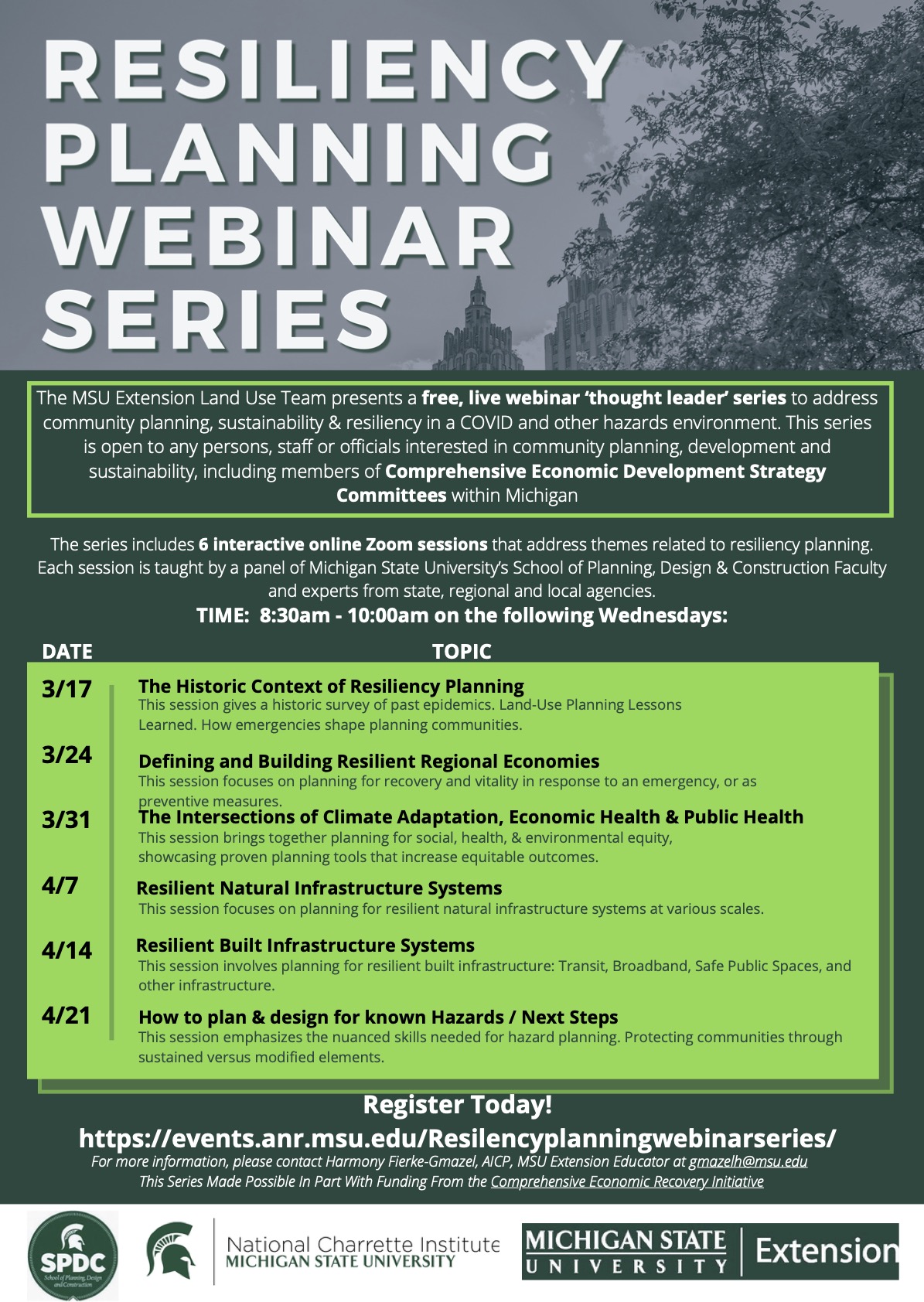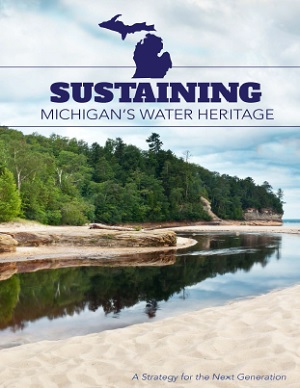EMCOG has agreed to act as the lead agency in the development of a Regional Housing Partnership Plan for Region G, that includes Arenac, Bay, Clare, Gladwin, Gratiot, Isabella, Midland, and Saginaw Counties. This Plan was accepted by the Michigan State Housing Development Authority (MSHDA) in conjunction with the MSHDA Statewide Housing Plan.
This Plan was put into action in early 2024 with the three committees, comprised of local municipal leaders, real estate professionals, housing professionals, bankers, and other private sector representatives, working on the goals and strategies.
Persons interested in participating on one of the three (3) committees, Communication & Education, Homeownership, or Housing Stock are encouraged to contact Bill Ernat, Program Manager, at bernat@emcog.org.
In accordance with EDA requirements, the East Michigan Council of Governments’ (EMCOG) recently completed its 2023 annual review of the 2021-2025 Comprehensive Economic Development Strategy (CEDS).
The CEDS was reviewed by EMCOG’s Regional Economic Development (RED) Team members for updates, which were then submitted to EMCOG’s Full Council for final approval prior to submission to EDA. On January 19, 2024, EMOG’s Regional Economic Development (RED) Team approved the CEDS update, the contents of which are found on the following pages. The list of any changes is included in the tables found on pages 2-10.
Those items that have been addressed, along with actions taken, are included in this report. Those items that have not been addressed, while not included in this year’s update, are anticipated to be reviewed again as part of the update in 2025 and again in the full update in 2026.
In addition to the review of the goals and strategies, it was decided that projects would be identified and included in this annual update to reflect possible projects that could be eligible for future EDA funding. Multiple discussions were held on what types of projects should be included 26projects were identified as possible projects for funding. These projects are found on pages 11-19.
This ALICE Report provides the first look at the extent of financial hardship in Michigan using ALICE metrics since the COVID-19 pandemic began. The pandemic has disrupted longstanding patterns in how and where people live, work, study, save, and spend their time. And the story of ALICE and the pandemic is still unfolding, amid an ongoing health crisis and an economic and public policy landscape that continues to shift. In a time of change, United For ALICE remains committed to providing the most up-to-date local data possible on financial hardship in Michigan and across the U.S.
This policy is intended to cover the provision of data for entities (local units of government, agencies, individuals, etc.) located in counties that pay a full countywide membership appropriation. The county-wide membership allows every local unit within the county, including non-profits, access to EMCOG services including provision of data, etc. The policy also addresses requests from specific entities or individuals located in non-participating counties.
The EMCOG 2020 EDA CARES Act Covid Economic Recovery Strategy and 2023 update of the 2021-2025 CEDS Update of Significant Employers have been Approved.
The East Michigan Council of Governments met in formal session on Friday, January 20, 2023, at Saginaw Valley State University. A quorum was present, and the following actions were taken regarding approval of the 2020 EDA CARES Covid Economic Recovery Strategy and the 2021-2025 CEDS Annual Performance report (which includes the EDA CARS Covid Recovery Strategy and updated EMCOG significant employers).
1. Authorize RED Team review and approval of the 2020 EDA CARES Covid Economic Recovery Strategy. Moved by Dworzecki, seconded by O'Farrell to authorize the RED Team's review and approval of the 2020 EDA CARES Covid Economic Recovery Strategy. Motion carried.
2. Authorize RED Team review and approval of the 2021-2025 annual performance report, which includes the EDA CARES Covid Recovery Strategy and updated EMCOG significant employers to the EDA Chicago Regional Office. Moved by Dworzecki, seconded by O'Farrell to authorize RED Team review and approval of the 2021-2025 CEDS annual performance report, which includes the EDA CARES Covid recovery Strategy and updated EMCOG significant employers to the EDA Chicago Regional Office. Motion Carried.
The Regional Economic Development Team (RED Team), which is the designated CEDS Team for EMCOG, met following the Council Meeting. The following actions were taken regarding approval of the 2020 EDA CARES Covid Economic Recovery Strategy and the 2021-2025 CEDS Annual Performance report (which includes the EDA CARS Covid Recovery Strategy and updated EMCOG significant employers).
Review and approval of the 2020 EDA CARES Covid Economic Recovery Strategy and&2021-2025 annual performance report, which includes the EDA CARES Covid recovery Strategy and updated EMCOG significant employers to the EDA Chicago Regional Office. Moved by Wright, seconded by Dworzecki to approvethe 2021-2025 CEDS annual performance report, which includes the EDA CARES Covid recovery Strategy and updated EMCOG significant employers to the EDA Chicago Regional Office. Motion Carried.
Go to the 2022 Addendum to 2021-2025 CEDS page to find these documents.
The MSU Extension Land Use Team presents a free, live webinar 'thought leader' series to address community planning, sustainability & resiliency in a COVID and other hazards environment. This series is open to any persons, staff or officials interested in community planning, development and sustainability, including members of Comprehensive Economic Development Strategy Committees within Michigan. The series inchudes 6 interactive online Zoom sessions that address themes related to resiliency planning. Each session is taught by a panel of Michigan State University's School of Planning, Design & Construction Faculty and experts from state, regional and local agencies.
Register here: https://events.anr.msu.edu/Resilencyplanningwebinarseries/
On January 15, 2021 the EMCOG Council authorized the Regional Economic Development Team (RED Team) and staff to finalize and submit the 2021-2025 CEDS to EDA Chicago. The RED Team convened immediately after the Council meeting to finalize and approve the CEDS.
Approval of the 2021-2025 CEDS is the result of a year long process which began in January of 2020. TIP Strategies, Inc. assisted in the development of the CEDS document with support from EMCOG for both the development as well as facilitation of the stakeholder/public participation. Attendance at 35 public CEDS development meetings from January of 2020 to January of 2021 totaled over 350 participants. Due to the pandemic, these meetings switched to a virtual format beginning in March of 2020.
The proposed CEDS was posted on the EMCOG website in early December with notification sent out to approximately 270 contacts to invite public comment. Some of the comments resulted in recommended changes to the CEDS document which staff brought before both Council and the RED Team for consideration. With the support of both Council and the RED Team, these changes were incorporated into the final approved CEDS.
Following approval of the new CEDS on January 15th, EMCOG and the RED Team hosted an implementation workshop with breakout groups consistent with the five focus areas of the CEDS: Infrastructure, Workforce, Innovation, Place-making, and Economic Development. The results of this workshop will begin to fill out the CEDS Implementation Matrix by identifying those actions that can be started within the first 60 days along with the implementation partners. CEDS Implementation will be a standing agenda item for the RED Team beginning at their next meeting on March 5th. All meetings are open to the public.
Download the EMCOG New 5-Year CEDS Document
For information on the CEDS please contact Jane Fitzpatrick at jfitpatrick@emcog.org
The East Michigan Council of Governments (EMCOG) Proposed Five-Year Comprehensive Economic Development Strategy(CEDS): 2021-2025 plan includes ambitious initiatives, and it is not feasible for any one organization to lead the implementation for such a large region. To meet the objectives outlined in this CEDS plan, the region must come together collectively to creatively and strategically accomplish the action items. Furthermore, this plan should be viewed as a dynamic document that invites revision and refinements as condition change.
We invite public comment on this plan which can be found at the link below. Please submit your comments no later than close of business day on January 14, 2020 to:
Jane Fitzpatrick: jfitzpatrick@emcog.org
or mail them to:
EMCOG
East Michigan Council of Governments
3144 Davenport Avenue, Suite 200, Saginaw, MI. 48602
Download Proposed Comprehensive Economic Development Strategy (CEDS): 2021-2025
To suppress the spread of COVID-19, to prevent the state’s health care system from being overwhelmed, to allow time for the production of critical test kits, ventilators, and personal protective equipment, and to avoid needless deaths, it is reasonable and necessary to direct residents to remain at home or in their place of residence to the maximum extent feasible.
This order takes effect on March 24, 2020 at 12:01 am, and continues through April 13, 2020 at 11:59 pm.
The East Michigan Council of Governments (EMCOG) a region consisting of 14 counties in east central Michigan has chosen Austin-and Seattle-based TIP Strategies to guide the update to the region’s Comprehensive Economic Development Strategy (CEDS).
"We are very excited to assist EMCOG with this important work," said TIP Strategies Senior Partner Jeff Marcell, "we look forward to working closely with EMCOG in designing a blueprint that will ensure the region is positioned for a bright economic future."
The first phase of the project will kick off in January, 2020. The TIP consulting team will conduct multiple stakeholder interviews and roundtables to understand the community’s economic priorities and successes since the development of the existing 2016-2020 CEDS. That information will be combined with the latest statistical data available to inform the proposed strategies. The resulting strategy will identify regional goals and the strategies for implementation over the next five years, and will be in accordance with EMCOG’s 2019-2022 USDOC/EDA Partnership Planning grant and CEDS requirements. Although the action plan is designed for five years, the anticipated outcomes will extend well beyond the timeline and improve the region’s long term competitiveness.
The 2020 M-15 Byways Corridor Management Plan is available for review.
The East Michigan Council of Governments (EMCOG) has engaged the economic development consulting firm TIP Strategies, based in Austin and Seattle to lead the strategic planning process for producing a new 5-year Comprehensive Economic Development Strategy (CEDS) for the 14-County EMCOG Region.
As part of the planning process, we are seeking the input of key stakeholders that play important roles in the economic health of the region. We invite you to participate in a discussion about solutions to the region’s economic challenges. As a business or community leader, your input on strategies for the region is critical. The focus sessions represent the 5 goal areas of the current CEDS document which can be found at http://www.emcog.org/ceds.asp These five goal areas may change as a result of this strategic planning process.
Eighteen (18) projects will receive a boost in funding thanks to the East Central Michigan Prosperity Region 5 Grant awards from the East Michigan Council of Governments (EMCOG). EMCOG is distributing $145,000 to projects that support various economic development, workforce development, transportation, educational, outdoor recreation/tourism and place-making initiatives throughout the 8 county Prosperity Region 5.
A Summary Report Prepared by the East Michigan Council of Governments
ALICE (Asset Limited, Income Constrained Employed) lives in every community. In the East Michigan Council of Governments (EMCOG)[1] 1 out of every 2.2 households (45%) are earning less than what is needed (the ALICE Threshold) to afford the basics, such as housing, child care, food, transportation, health care and technology. The numbers vary by county from a low in Midland County of 34% to a high in Clare County of 55%. The number of households within the EMCOG Region not earning enough to afford the basics has increased since the 2017 report (1 out of every 2.4 households or 42% as reported in 2017). Statewide the number of households as reported in the 2019 report, amounts to 43% with income below the ALICE Threshold.
The 2019 Michigan Report “ALICE In Michigan: A Financial Hardship Study” was released in March of 2019. It is the third report produced by the Michigan Association of United Ways. The first report was released in 2015, and an update was released in 2017. The following are quotes from the executive summaries of each of the three reports which briefly summarize the findings and trends in quantifying how Michigan households are doing.
2015 Report: “ALICE households are working households; they hold jobs and provide services that are vital to the Michigan economy in positions like retail salespeople, team assemblers, truck drivers, nursing assistants and paramedics. The core of the problem is that these jobs do not pay enough to afford the basics of housing, child care, food, health care and transportation. The growth of low-skilled jobs is projected to outpace that of medium and high skilled jobs into the next decade. At the same time, the cost of basic household necessities continues to rise. (Source: ALICE Michigan, Executive Summary, September, 2014)
2017 Report: “ALICE households have incomes above the Federal Poverty Level, but still struggle to afford basic household necessities. Although evidence is emerging that jobs and wages are improving, the percent of households struggling has only improved (statewide) from 41% in 2010 to 40% in 2012 and has remained flat since.” (Source: ALICE Michigan, Executive Summary, Winter, 2017)
2019 Report: “Despite overall improvement in employment and gains in median income, the economic recovery in Michigan has been uneven. Many ALICE households continue to face challenges from low wages, reduced work hours, depleted savings, and increasing costs. For many households that earned slightly above the ALICE Threshold in the past, increases in the cost of living and flat wages have pushed them below the Threshold and into financial hardship. The total number of Michigan households that cannot afford basic needs increased 6 percent from 2010 to 2017”. (ALICE In Michigan, Executive Summary, March, 2019)
View a summary analysis of ALICE in EMCOG
The report includes analyses from each of the 3 reports (2015, 2017 and 2019). The summary includes links to the Michigan Report. Please Contact Jane Fitzpatrick at jfitzpatrick@emcog.org for further information on the EMCOG prepared regional reports.
[1] EMCOG consists of Arenac, Bay, Clare, Gladwin, Gratiot, Huron, Iosco, Isabella, Midland, Ogemaw, Roscommon, Saginaw, Sanilac and Tuscola counties.
Eligible Applicants
All county or municipal governments (city, village, township), downtown development authorities and economic development authorities, nonprofits, educational institutions, adult education agencies, workforce development agencies in the East Central Michigan Prosperity Region 5.
The third annual East Central Michigan Prosperity Region 5 Mini-Grant Program is being led by the East Michigan Council of Governments (EMCOG). This project is funded by the State of Michigan as part of the state’s Regional Prosperity Initiative. The third year program includes two tiers of grants as described below. Further information, including the grant applications and instructions will be sent out within a week or two and also will be available at www.emcog.org (NOTE: the grant applications for 2019 will be different than prior years; be sure to use the correct application forms).
EMCOG is required to submit an annual assessment of the Comprehensive Economic Development Strategy (the CEDS) by January 31 of each year. Included in this annual assessment is an updated Appendix B, Implementation Matrix which includes progress for each action item that was scheduled to be initiated during the reporting year.
The 8-County East Central Michigan Prosperity Region 5 maintains a dashboard that measures progress/changes in several measurable metrics to monitor movement/dynamics relating to the goals, objectives and actions within the regional strategy. The metrics were determined by the PR-5 Strategic Management Team (the Collaborative) during the development of the strategy in 2014. The following is a summary of the dashboard based on the most recent update that was completed for the third quarter of 2018.
Eighteen projects out of 42 applications will receive a boost in funding thanks to the East Central Michigan Prosperity Region 5 Mini and Micro Grant awards announced this week from the East Michigan Council of Governments (EMCOG). This is the second year of the EMCOG grant program which is funded by Michigan’s Regional Prosperity Initiative (RPI). EMCOG is distributing $132,000 to projects that support various economic development, workforce development, transportation, educational, outdoor recreation/tourism and place-making initiatives throughout the 8 county Prosperity Region 5. In total, 42 applicants applied for funding.
The second annual East Central Michigan Prosperity Region 5 Grant Program is being led by the East Michigan Council of Governments (EMCOG). This project is being funded by the State of Michigan as part of the state’s Regional Prosperity Initiative.
Selected Federal Agency Announcements and Related for the Week of February 5th, 2018 - The following is a selection of recent announcements gleaned from various federal sources and colleagues, and is provided to EDA's Economic Development Integrators to increase our awareness of complementary resources for economic development.
Eight projects will receive a boost in funding thanks to the East Central Michigan Prosperity Region 5 Mini Grants awards announced this week from the East Michigan Council of Governments (EMCOG).
The first time mini-grants, funded by Michigan’s Regional Prosperity Initiative (RPI) will distribute $100,000 to projects that will support various economic development, transportation, educational, outdoor recreation/tourism and place-making initiatives throughout the 8 county region. In total, 14 projects competed for this first round of funding.
The findings of the study reveal a region facing important challenges. Perhaps the most productive role for the report is to provide a benchmark of the current status of the region’s labor force and potential labor force – to be used by stakeholders to identify areas where economic developers would like to encourage growth and development; to aid economic developers as they leverage the regions resources; and to facilitate conversations aimed at identifying key strategies to positively impact the region’s economy and move it forward in a positive and sustainable way.
Michigan's Office of the Great Lakes, along with several other state agencies, has authored a long-awaited comprehensive water strategy document. Michigan’s Water Strategy will, for the first time in our state’s history, outline a vision for the future for managing, protecting and enhancing one of our greatest natural assets: abundant freshwater resources.


